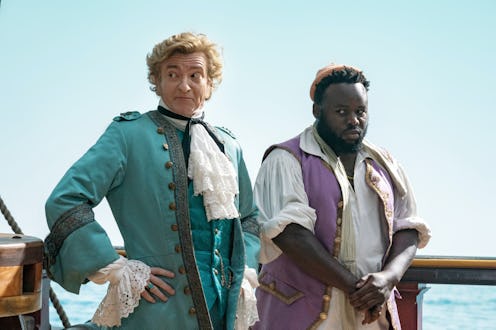TV & Movies
The Wild & Kind Of True Story Behind Our Flag Means Death
The HBO Max comedy follows the misadventures of infamous pirates Stede Bonnet and Blackbeard.

HBO Max’s new comedy Our Flag Means Death brings together two unlikely friends: an aristocrat named Stede Bonnet (Rhys Darby) who trades in his cushy life to become a swashbuckling pirate, and Blackbeard (Taika Waititi), one of the most infamous pirates to have ever lived. The series is set in 1717 and follows real-life figures, but exactly how true is the true story it’s loosely based on?
The answer: only kind of. Though Bonnet was a real person, it’s impossible to verify all of the pirate misadventures that are bound to take place on Our Flag Means Death. Blackbeard and Bonnet existed over 300 years ago and didn’t exactly keep diaries of their crimes. However, the two did know each other.
According to Smithsonian Magazine, Bonnet was sometimes called “The Gentleman Pirate” due to his wealthy upbringing. Per Ars Technica, he was born in Barbados in 1688 to a rich English family and inherited a 400-acre estate when his father died in 1694. He married, had four children, and briefly served in the military as a major, though there is no record that he engaged in active combat. But at age 29, he had a midlife crisis, abandoning his wife, children, land, and fortune to buy a ship and begin a new life at sea.
What drove him to make such a decision is unclear: according to Smithsonian, piracy was in the midst of a golden age and was considered both a lifestyle and political cause. However, Bonnet had no seafaring experience and “no apparent reason to rage against the establishment.” Some accounts have pointed to “discomforts” he “found in the married state,” while many think he experienced some kind of mental breakdown. Legal records also show he borrowed £1700 (about $400,000 today) at the time, suggesting he may have had financial troubles.
"Bonnet may have been unbalanced," David Moore, an archaeologist and historian with the North Carolina Maritime Museum in Beaufort, told Smithsonian. "From the genealogical record we know that there had been disruptions in his life. One of his children had died." Most likely, Moore added, Bonnet was motivated by a combination of personal and political pressures: Though it’s impossible to know for sure, Woodard says that Bonnet was probably a Jacobite, supporting James Stuart as King of England over the German-born George I. “Most pirates at the time thought of themselves as in revolt against King George,” he explained.
Regardless of his reasoning, Bonnet was committed to his new life. He purchased a ship — which he named Revenge despite having no enemies — and armed it with 10 cannons and 70 crew members. Both his crew and other pirates considered him an inept captain, but after sailing to Virginia, he quickly captured several ships — thanks in large part to the skill of the experienced pirates he employed. Shortly afterward, Bonnet met Blackbird (aka Edward Teach), though there are differing accounts about where they first encountered each other. Smithsonian reports that it was in Honduras, a popular pirate hangout, while Ars Technica says it was in Nassau after Bonnet and his ship had a run-in with a Spanish Man of War ship and headed there to get repairs.
In any case, Bonnet soon ceded control of the Revenge to Blackbeard, an English-born pirate who’d worked his way up from deckhand to captain of his own ship — the 40-gun Queen Anne's Revenge — and “cultivated a reputation for wildness and unpredictability,” per Smithsonian.
After some discord between the two men, Bonnet eventually regained control of his ship, vowing revenge on Blackbeard who continued to run his Queen Anne ship. Back in command, Bonnet plundered merchant vessels, improving his skills and ultimately earning a fearsome reputation of his own. "Stede Bonnet was part of a gang of pirates operating in the Caribbean that are responsible for the images we have of pirates today," historian Colin Woodard, author of The Republic of Pirates, told Smithsonian.
Soon, the governor of South Carolina caught wind of Bonnet and ordered his arrest. After a bloody battle in which Bonnet declared he would blow up himself and the ship before he would surrender, he was captured in 1718. He tried to use his aristocratic background to appeal to the governor, blaming all of his crimes on Blackbeard. But though his trial did drag out long after his men’s, Bonnet was eventually hanged on Dec. 10, 1718, less than two years after he began his pirating career. Blackbeard died just a month before, during a battle with the British Royal Navy.
Based on the trailer for Our Flag Means Death, historical accuracy won’t be its focus. Think of the show more like Hulu’s The Great, which parodies and embellishes real facts and figures for the sake of comedy.